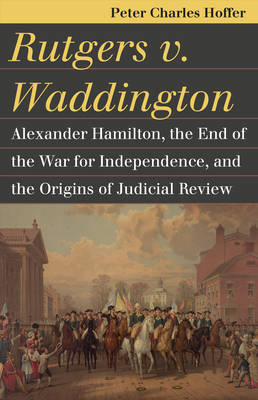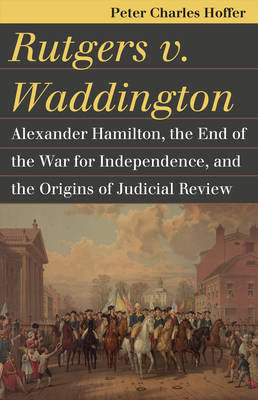
- Retrait gratuit dans votre magasin Club
- 7.000.000 titres dans notre catalogue
- Payer en toute sécurité
- Toujours un magasin près de chez vous
- Retrait gratuit dans votre magasin Club
- 7.000.0000 titres dans notre catalogue
- Payer en toute sécurité
- Toujours un magasin près de chez vous
Rutgers V. Waddington
Alexander Hamilton, the End of the War for Independence, and the Origins of Judicial Review
Peter Charles Hoffer
29,45 €
+ 58 points
Description
Once the dust of the Revolution settled, the problem of reconciling the erstwhile warring factions arose, and as is often the case in the aftermath of violent revolutions, the matter made its way into the legal arena. Rutgers v. Waddington was such a case. Through this little-known but remarkable dispute over back rent for a burned-down brewery, Peter Charles Hoffer recounts a tale of political and constitutional intrigue involving some of the most important actors in America's transition from a confederation of states under the Articles of Confederation to a national republic under the U.S. Constitution. At the end of the Revolution, the widow Rutgers and her sons returned to the brewery they'd abandoned when the British had occupied New York. They demanded rent from Waddington, the loyalist who had rented the facility under the British occupation. Under a punitive New York state law, the loyalist Waddington was liable. But the peace treaty's provisions protecting loyalists' property rights said otherwise. Appearing for the defendants was war veteran, future Federalist, and first secretary of the treasury, Alexander Hamilton. And, as always, lurking in the background was the estimable Aaron Burr. As Hoffer details Hamilton's arguments for the supremacy of treaty law over state law, the significance of Rutgers v. Waddington in the development of a strong central government emerges clearly--as does the role of the courts in bridging the young nation's divisions in the Revolution's wake. Rutgers v. Waddington illustrates a foundational moment in American history. As such, it is an encapsulation of a society riven by war, buffeted by revolutionary change attempting to piece together the true meaning of, in John Adams' formulation, "rule by law, and not by men."
Spécifications
Parties prenantes
- Auteur(s) :
- Editeur:
Contenu
- Nombre de pages :
- 168
- Langue:
- Anglais
- Collection :
Caractéristiques
- EAN:
- 9780700622054
- Date de parution :
- 12-02-16
- Format:
- Livre broché
- Format numérique:
- Trade paperback (VS)
- Dimensions :
- 140 mm x 213 mm
- Poids :
- 226 g

Les avis
Nous publions uniquement les avis qui respectent les conditions requises. Consultez nos conditions pour les avis.






